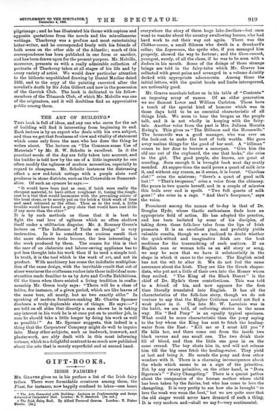GIFT-BOOKS.
IRISH FAIRIES.t Ma. G aivEs gives us in his preface a list of the Irish fairy tribes. There were formidable creatures among them, the Piast, for instance, now happily confined to lakes—one hears
• The Art, Connected with Building: Lectures on Craftsmanship and Design &livered at Carpenters' Haft. London B. T. Botsford. [5s. net.] f The Irish Fan Book. 13y Alfred Pereeval Graves. London: T. Fisher Unwin. [6s.]
everywhere the story of these huge lake-dwellers—but once wont to wander about the country swallowing heroes, who bad bard work to cut their way out again. There was the Clobher-ceann, a small Silenus who dwelt in a drunkard's cellar; the Lepracaun, the sprite who, if you managed him properly, showed the way to fortune; and the Gean-canach, youngest, surely, of all the clans, if he was to be seen with a dudeen in his mouth. Some of the doings of these strange beings are told in the fairy-tales which Mr. Graves has collected with great pains and arranged in a volume daintily decked with appropriate adornments. Among these the initial letters, with the quaint heads and limbs interspersed, are noticeably good.
Mr. Graves marshals before us in his table of " Contents" an imposing array of names. Of an older generation we see Samuel Lover and William Carleton. These have a touch of the special kind of humour which was in those days held to be an essential characteristic of all things Irish. We seem to bear the brogue as the people talk, and it is not wholly in keeping with the fairy- tale. Another voice from the past is Mrs. Juliana, Horatio. Swing's. This gives us " The Hillman and the Housewife." The housewife was a good manager, who was ever on the look-out to make the best of both worlds. She gave away useless things for the good of her soul. A " hillman" comes to her door to borrow a saucepan. "Give him the old one out of the cupboard, the one that leaks," she cries to the girl. The good people, she knows, are great at mending. Sure enough it is brought back next day neatly mended. At supper-time the maid pours a quart of milk into it, and without any reason, as it seems, it is burnt. "Careless slut!" cries the mistress ; " there's a quart of good milk lost !" " That's twopence," cries a voice from the chimney. She pours in two quarts herself, and in a couple of minutes this boils over and is spoilt. " Two full quarts of milk gone ! " she cries in a rage. " And that's fourpence," says the voice.
Prominent among the names of to-day is that of Dr. Douglas Hyde, whose Gaelic enthusiasm finds here an appropriate field of action. He has adopted the practice, and has been imitated by some of his disciples, of taking down these folk-lore tales from the lips of Irish peasants. It is an excellent plan, and probably yields valuable results, though we are inclined to doubt whether the quick-witted and imaginative Irish are the best mediums for the transmitting of such matters. If an English man or woman tells us an old story or song, we may be sure that we have it substantially in the shape in which it came to the repeater. The English mind has not the wit to alter it. We do not feel the same assurance about the Irish. They are like the Greek rhapso- dists, who put not a little of their own into the Homer whom they recited. " The King of the Black Desert " is the chief of Dr. Hyde's three contributions. This was told to a friend of his, and now appears for the first time literally translated into English. It has all the characteristics of the folk-lore story, though we do not venture to say that the Higher Criticism could not find a weak place in it. The late Mr. W. Larminie was in the habit, we are told, of collecting stories in the same way. His "Red Pony" is an equally typical specimen. What could be more characteristic than the pony saying to the boy whom the King has sent to fetch the healing- water from the East: "Kill me or I must kill you " ? He kills her, and there come out from the inside two black ravens and one small one. The two drink their fill of blood, and then the little one goes in on the same errand. The boy shuts him in, and will not release him till the big ones fetch the healing-water. They yield at last and bring it. He mends the pony and does other wonders with it. There is a charming inconsequence about the whole which seems to us a sign of the primitive. Not by any means primitive, on the other hand, is "Dora Sigerson's " " Fairy Changeling." There is a quaint pathos about the compassion of the human mother whose child has been taken by the fairies, but who has come to love the changeling. It is very pretty to see how she is brought " to love the weak wee wean the best," but we are quite sure that the old singer would never have dreamed of such a thing. It is very modern and—shall we say P—very sentimentaL






































































 Previous page
Previous page